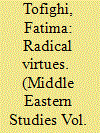| Srl | Item |
| 1 |
ID:
183755


|
|
|
|
|
| Summary/Abstract |
Disillusioned by possibilities of political reform in an economically developing country, the Irani-an radicals of the 1960s and 70s adopted certain practices. These bodily techniques served both practical concerns and radical self-fashionings. That is, the guerrilla fighters had to familiarize themselves with mountains and forests, recruit members from the working class, and subsist on minimal means in communal houses. But they also would not succumb to the newly-emerging comprador bourgeois values that was, in their opinion, feeding imperialism. In this article I study those bodily practices in their global context, by reference to the practical and theoretical back-ground. It is interesting that while the paramilitary or theoretical aspects of these movements were not always appealing to the larger society, the bodily ethics could intrigue people from across the political or religious spectrum. The particular virtues of self-sacrifice, resilience, self-reliance, seriousness, among other things were cultivated by means of bodily practices. By these kinds of bodily resistance, Iranian radicals formed a subjectivity outside the dominant/dominated binary, where increasing political consciousness involved lifestyle changes on the most private surface.
|
|
|
|
|
|
|
|
|
|
|
|
|
|
|
|
| 2 |
ID:
169199


|
|
|
|
|
| Summary/Abstract |
The Maoist creed depended upon a large core of devout, dedicated believers who sought in their personal lives to abide by the revolution’s teachings. Based on close reading and careful analysis of 679 private letters from 1961 to 1986, this article explores the self-cultivation of socialist personhood by a politically devout married couple and their close relatives, who shared with one another how they lived and felt. A tension between personal concerns with family life and an ideologically charged commitment to personal political progress are identifiable in many of the letters and provide a key to understanding the rise and fall of political commitment and socialist personhood over the course of two decades. The conjugal letters reveal that within this family the husband strategically chose a discourse of class struggle and the wife a discourse of gender equality, and each utilized politically prescribed language to push for their own agenda within the family. It will be seen how the combination of their concerns with family life, the tensions entailed in the gender discourse, and the rise of materialist concerns in the 1970s eventually contributed by the 1980s to their abandonment of communist ideology and self-cultivation.
|
|
|
|
|
|
|
|
|
|
|
|
|
|
|
|
| 3 |
ID:
182947


|
|
|
|
|
| Summary/Abstract |
The requirement for “self-development” through the ceaseless acquisition of skills and credentials has long been central for young adults in China. However, due to the multiple and unpredictable demands of social institutions, many social actors also prime the cultivation of a self that does not succumb to immediate occupational and material impositions. In this article, I describe how young adults in a second-tier city pursue a model of personhood that brings together socio-economic competence and singular individuality. These individuals aspire to expand their range of experiences and their spatial mobility, thereby reifying an image of a self that transcends narrow social roles and networks. Drawing on Jean-Paul Sartre's dualistic philosophy, I analyse young adults’ attempts to realise individualised selves by destabilising their ontological ground. I argue that this phenomenon is magnified in China through widespread notions of a “moral crisis” and its supposable suppression of social actors’ agency.
|
|
|
|
|
|
|
|
|
|
|
|
|
|
|
|